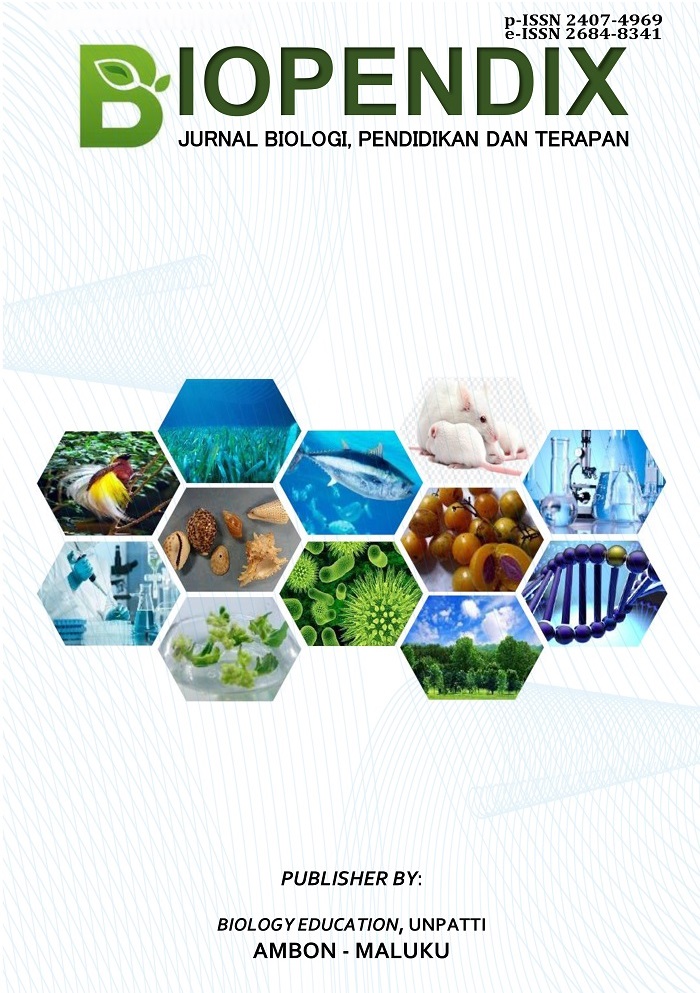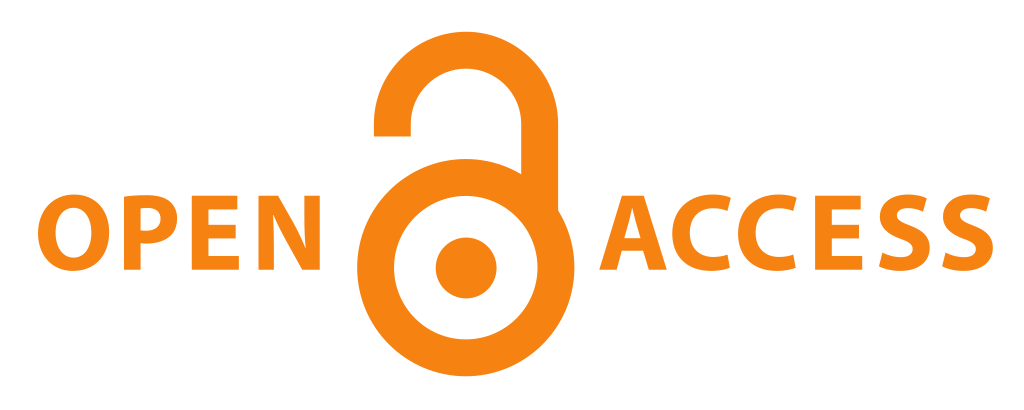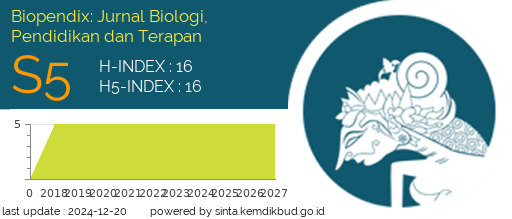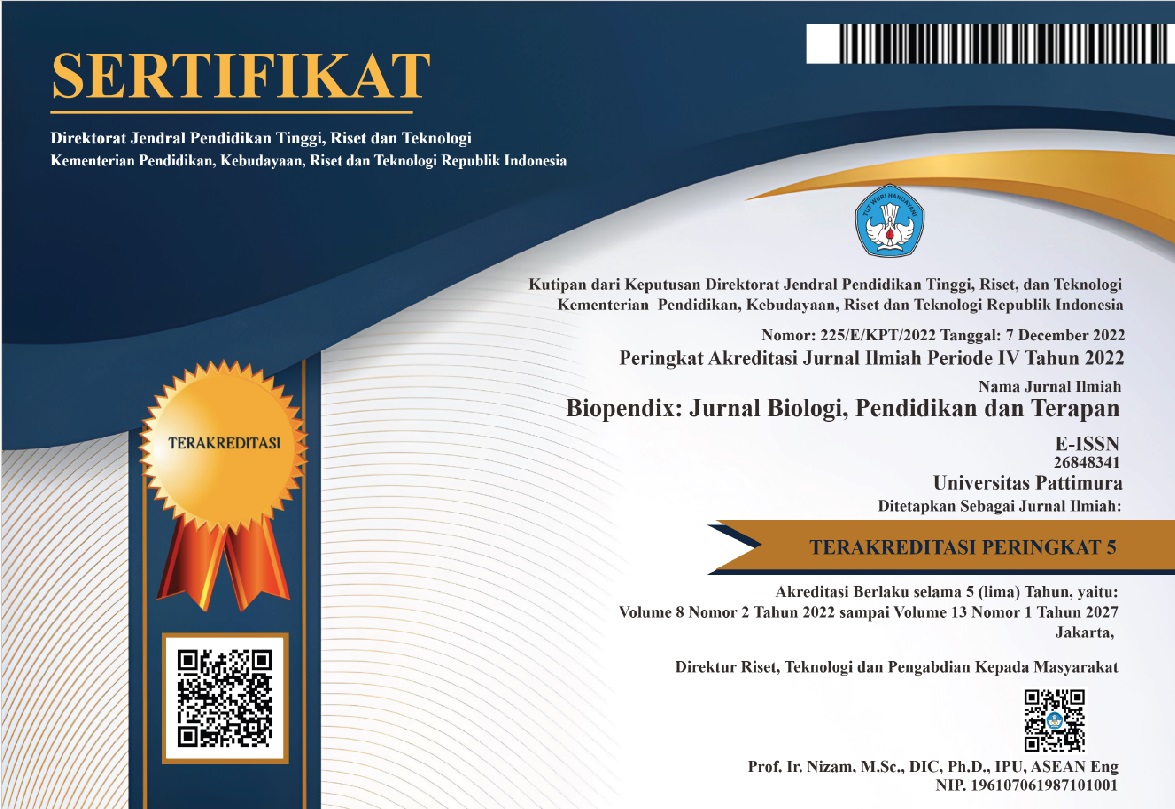The 2P3A Learning Model in Developing Argumentation Ability, Literacy Skills and Problem Solving Skills
Abstract
Education is requires students to have skills to support the learning process in the 21st century. 21st century learning skills can be trained in various ways including through the learning model used by the teacher. The 2P3A learning model consists of 5 main stages, namely the Preparation stage, the Problem Statement stage, the Analyze stage, the Argument stage and the Application stage. This learning model focuses on training and improving argumentation skills, problem solving skills and literacy skills of students. Argumentation skills are enhanced at the Argument stage where students will be trained to state their views about a problem, Problem solving skills are improved through the Analyze stage where students are trained to look for and analyze problems given and Literacy Skills can be trained through the Preparation stage where students will be accustomed to read the learning material before starting the learning process.
Downloads
References
Agusni, H. P., Wahyudi, I., & Abdurrahman. (2019). Pengaruh Skill Argumentasi Menggunakan Model Problem Based Learning Terhadap Hasil Belajar Siswa. Journal Pendidikan, 2(1), 97–104.
Argaw, A. S., Haile, B. B., Ayalew, B. T., & Kuma, S. G. (2016). The Effect of Problem Based Learning (PBL) Instruction on Students’ Motivation and Problem Solving Skills of Physics. EURASIA Journal of Mathematics, Science and Technology Education, 13(3). https://doi.org/10.12973/eurasia.2017.00647a
Cho, K.-L., & Jonassen, D. H. (2002). The effects of argumentation scaffolds on argumentation and problem solving. Educational Technology Research and Development, 50(3), 5–22. https://doi.org/10.1007/BF02505022
Choeriyah, H., Dwi, Y., & Ian, Y. (2021). Pengembangan Lembar Kerja Siswa (LKS) Fisika Berbasis Problem Based Learning Untuk Meningkatkan Kemampuan Pemecahan Masalah. Unnes Physics Educatioon Journa. 10 (1). h.82-87.
Ekawati, M. (2019). Teori Belajar Menurut Aliran Psikologi Kognitif Serta Implikasinya dalam Proses Belajar dan Pembelajaran. E-Tech, 07(IV).
Faiqoh, N., Khasanah, N., Astuti, L. P., Prayitno, R., & Prayitno, B. A. (2018). Profil Keterampilan Argumentasi Siswa Kelas X dan XI MIPA di SMA Batik 1 Surakarta pada Materi Keanekaragaman Hayati. Jurnal Pendidikan Biologi, 7(3), 174. https://doi.org/10.24114/jpb.v7i3.10122
Fatmawati, D R., Harlita., Ramli M. (2018). Meningkatkan Kemampuan Argumentasi Siswa melalui Action Research dengan Fokus Tindakan Think Pair Share. Proceeding Biology Education Conference. 15 (1). h- 253-259.
Iskandar, I. (2016). Implementasi Teori Hirarki Kebutuhan Abraham Maslow terhadap Peningkatan Kinerja Pustakawan. Khizanah al-Hikmah : Jurnal Ilmu Perpustakaan, Informasi, dan Kearsipan, 4(1), 23–34. https://doi.org/10.24252/kah.v4i1a2
Kour, S. J., & Rafaqi, Mohd. Z. H. (2024). Factors Influencing Problem Solving Ability in Mathematics: A Systematic Review of Literature. Education India: A Quarterly Refereed Journal of Dialogues on Education, 13(1), 1–7.
Luckin, R., Holmes, W., Griffiths, M., & Forcier, L. B. (2023). The role of artificial intelligence in personalizing learning for 21st-century students. International Journal of Artificial Intelligence in Education, *33*(1), 1-24. https://doi.org/10.1007/s40593-023-00345-2
Mariska, R., & Abdul K. (2024). Implementasi Aliran Konstruktivisme Terhadap Kurikulum Merdeka Dalam Perspektif Filsafat Pendidikan Islam. Jurnal Inspirasi Pendidikan (ALFIHRIS). 2 (1), h-210-219. https://doi.org/10.59246/alfihris.v2i1.681
Odah, A., & Yeni Y. (2023). Budaya Literasi Sekolah untuk Mengembangkan Keterampilan Abad 21. Jurnal Basicedu. 7(6)., H-4193-4203. https://doi.org/10.31004/basicedu.v7i6.6730
OECD. (2004). Learning for Tomorrow’s World: First Results from PISA 2003. OECD. https://doi.org/10.1787/9789264006416-en
Panadero, E., & Anders, J. (2020). A Critical Review of the Arguments Against the Use of Rubrics. Education Research Review. V-30. https://doi.org/10.1016/j.edurev.2020.100329
Rokhmawati, J., Djatmika, E. T., & Wardana, L. (2016). Implementation of Problem Based Learning Model to Improve Students’ Problem Solving Skill and Self-Efficacy (A Study on Ix Class Students of SmpMuhammadiyah). IOSR Journal of Research & Method in Education (IOSR-JRME), 6(3), 51–55.
Sahyar, & Fitri, R. Y. (2017). The Effect of Problem-Based Learning Model (PBL) and Adversity Quotient (AQ) on Problem-Solving Ability. American Journal of Educational Research, 5(2), 179–183.
Saptono S, Mubarok I. (2021). Kemampuan Pemecahan Masalah Mahasiswa Calon Guru Biologi dalam Konteks Socioscientific Issues. Prosiding Semnas Biologi ke-9 Tahun 2021. Semarang: FMIPA Universitas Negeri Semarang; p. 149-153.
Saputra, W., & Muqowim. (2024). Implementasi Teori Belajar Konstruktivisme dalam Pembelajaran SKI: Studi Kasus pada Madrasah Aliyah di Kota Pekanbaru. Edukatif: Jurnal Ilmu Pendidikan. 6 (4)., h- 4048- 4056: p-ISSN 2656-8063 e-ISSN 2656-8071
Suparlan, S. (2019). Teori Konstruktivisme dalam Pembelajaran. ISLAMIKA, 1(2), 79 - 88. https://doi.org/10.36088/islamika.v1i2.208
Supiandi, M. I., & Julung, H. (2016). Pengaruh Model Problem Based Learning (PBL) terhadap Kemampuan Memecahkan Masalah dan Hasil Belajar Kognitif Siswa Biologi SMA. Jurnal Pendidikan Sains, 4(2), 60–64.
Suprihatin, S. (2017). Pendekatan Humanistik Dalam Pengembangan Kurikulum Pendidikan Agama Islam. POTENSIA: Jurnal Kependidikan Islam, 3(1), 82. https://doi.org/10.24014/potensia.v3i1.3477
Suwartini, S. (2016). Teori Kepribadian Social Cognitive: Kajian Pemikiran Albert Bandura Personality Theory Social Cognitive: Albert Bandura. Al Tazkiah, 5(1), 37- 46. https://doi.org/10.20414/altazkiah.v5i1.1325
Trilling, B., & Fadel, C. (2022). Reforming Curriculum for the 21st Century: Global Trends and Challenges. Journal of Curriculum Studies,54(3),1- 18. https://doi.org/10.1080/00220272.2022.2047089
Utami, N., Fitriani, H., & Efendi, I. (2023). Pengaruh Model Problem Based Learning (PBL) terhadap Kemampuan Memecahkan Masalah dan Hasil Belajar Kognitif Biologi Siswa Kelas VIII. Bioscientist : Jurnal Ilmiah Biologi, 11(1), 783. https://doi.org/10.33394/bioscientist.v11i1.7984
Wahyunan Widhi, M. T., Hakim, A. R., Wulansari, N. I., Solahuddin, M. I., & Admoko, S. (2021). Analisis Keterampilan Argumentasi Ilmiah Peserta Didik Pada Model Pembelajaran Berbasis Toulmin’s Argumentation Pattern (TAP) Dalam Memahami Konsep Fisika Dengan Metode Library Research. PENDIPA Journal of Science Education, 5(1), 79–91. https://doi.org/10.33369/pendipa.5.1.79-91
Wahyuni, S., Sutrisno, S., & Indrawati, I. (2021). Efektivitas model problem-based learning dalam meningkatkan keterampilan berpikir kritis. Jurnal Penelitian Pendidikan IPA, 7(2), 210-218. https://doi.org/10.30651/td.v11i2.18168
Wardani, A. D., Yuliati, L., & Taufiq, A. (2018). Kualitas Argumentasi Ilmiah Siswa pada Materi Hukum Newton. Jurnal Pendidikan: Teori, Penelitian, dan Pengembangan, 3(10), 1364–1372.
Zhang, J. (2025). Generative AI in Higher Education: Challenges and Opportunities for Course Learning. Advances in Social Sciences Research Journal, 12(01), 11- 18. https://doi.org/10.14738/assrj.1201.18121
Zubaidah, S. (2017). Keterampilan Abad Ke-21: Keterampilan yang diajarkan Melalui Pembelajaran. Seminar Nasional Pendidikan, 2(2), 1–17.
Zulfikar, Hariko, R., Muwakhidah, & Aritonang, N. (2017). Konseling Humanistik: Sebuah Tinjauan Filosofi. Jurnal Konseling GUSJIGANG, 3(1), 146–151
Copyright (c) 2025 Nur Afni, Husnaini Bahri

This work is licensed under a Creative Commons Attribution-ShareAlike 4.0 International License.
Authors who publish with this Journal agree to the following terms:
- Author retain copyright and grant the journal right of first publication with the work simultaneously licensed under a creative commons attribution license that allow others to share the work within an acknowledgement of the work’s authorship and initial publication of this journal.
- Authors are able to enter into separate, additional contractual arrangement for the non-exclusive distribution of the journal’s published version of the work (e.g. acknowledgement of its initial publication in this journal).
- Authors are permitted and encouraged to post their work online (e.g. in institutional repositories or on their websites) prior to and during the submission process, as it can lead to productive exchanges, as well as earlier and greater citation of published works





 2
2






